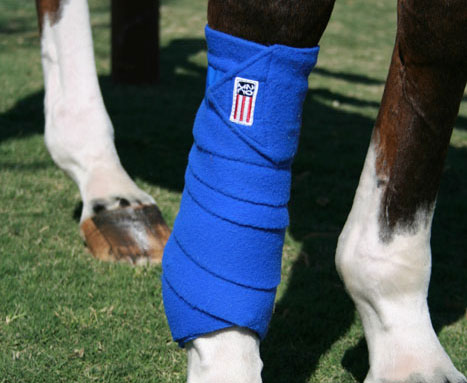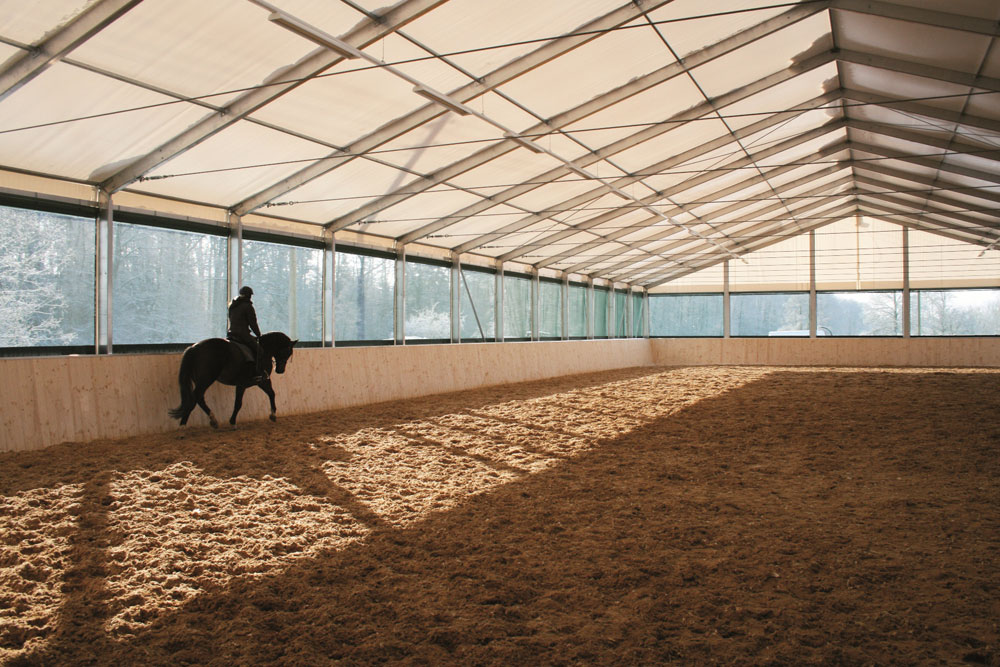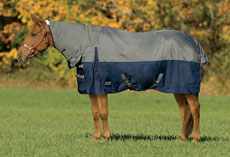Most horse-crazy kids insist to their parents that a horse could certainly live in their garage. While that’s a little far-fetched, it does reflect the first key decision about owning a horse: Where will you keep him?
Before buying your first horse, you should decide where he will live and who will be responsible for his care. If you don’t own a horse property, boarding is probably your only option, unless you have friends or family who live on a farm and wouldn’t mind having an extra horse around. Boarding arrangements for a monthly fee can be as simple as keeping your horse in someone’s pasture, where he has access to water and shelter, or as elaborate as full-service stables, where your horse has his own stall and is handled daily by barn workers.
If you can keep your horse at home, you may prefer caring for him yourself. Many people experience great satisfaction from taking charge of all aspects of their horses’ lives and don’t mind the considerable work; they wouldn’t have it any other way.
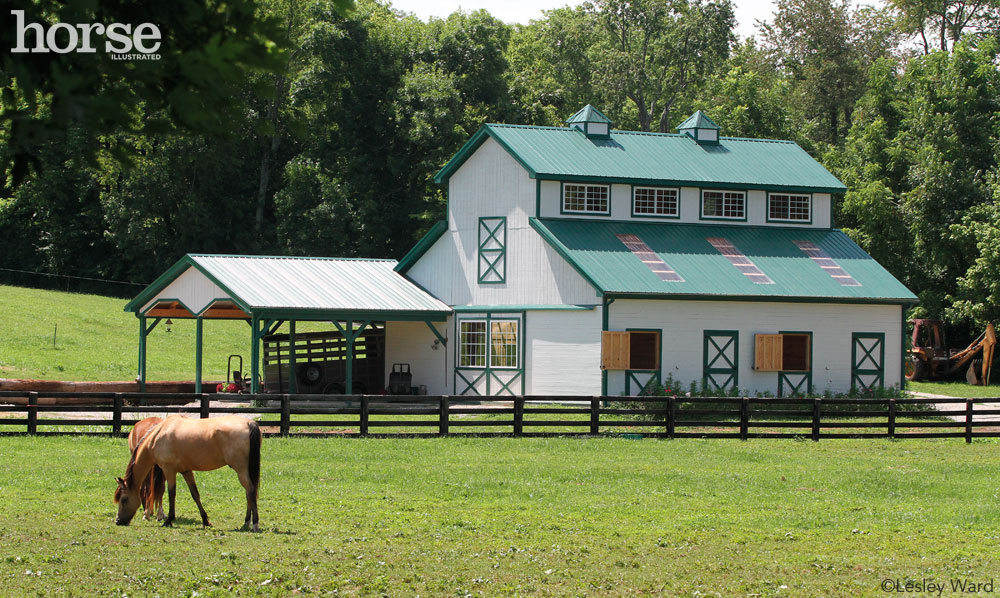
Yet, strange as it may seem to people who yearn for their own horse property, some prefer boarding to avoid the responsibility and commitment of twice-a-day feedings, barn chores, repairs and maintenance. The cost differential is probably not as wide as you think if you factor in all expenditures. (Buckets, feeders, hoses, manure forks, push brooms, wheelbarrows, rubber mats and other must-haves at your own barn add up.)
Safety First
No matter where you put your horse, a safe barn and secure pasture should be priorities because horses are amazingly prone to injuring themselves. They will find the loose board, popped nail, protruding tree branch, gopher hole, unprotected window glass, electric-fence short, barbed wire or any other hazard faster than a speeding bullet.
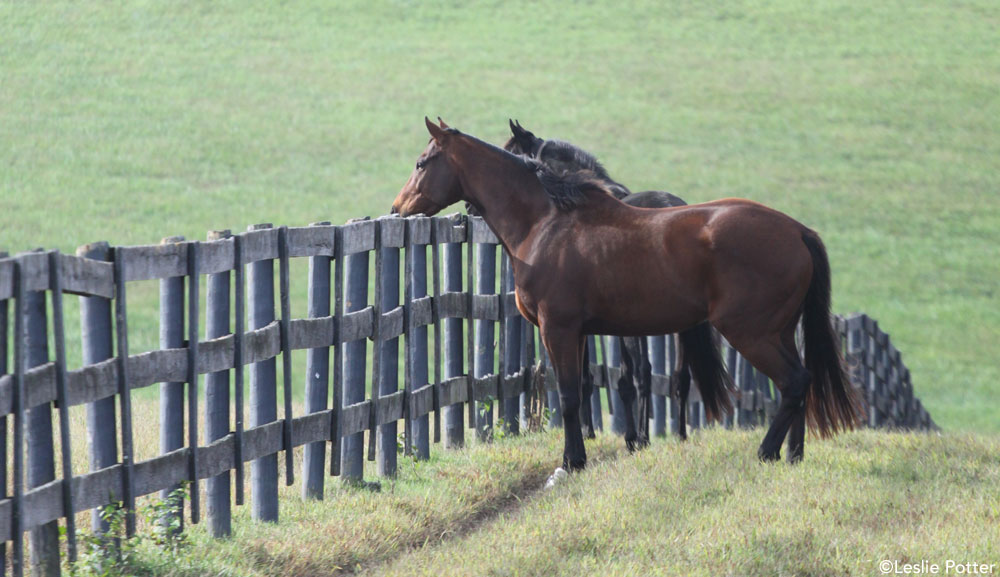
You should carry out periodic safety inspections of your horse’s home; don’t assume that boarding stables do this. Be as observant where you board as you would be at home, and let the barn manager know of potential hazards. When visiting your horse at the barn, look for an accessible fire extinguisher, posted phone numbers for emergencies, clutter-free aisles, dedicated space for manure forks and brooms, a neat tack room, and breakaway cross-ties.
What you don’t want to see are bags of feed easily accessible to a wily horse, loose metal siding on a shelter in your horse’s pasture, ice built up like a rink where your horse walks, protruding stall latches, or—worst of all—smokers in the barn. When you pay to have your horse cared for by someone else, you have every right to speak up about potential safety issues and expect resolution.
Horses at Home
Many veteran horse owners readily advise that if you want to actually ride your horse, you should keep him at a boarding stable. The longer you own horses, the wiser this seems. Yet, if your idea of heaven is to walk across your yard to visit your horses anytime, day or night, and this is more compelling than riding, then self-care might work best for you. The horse-oriented lifestyle is what attracts you most.
However, before losing yourself to the romantic dream of looking out your windows and seeing horses grazing peacefully in your pasture, give careful thought to the amount of time and energy you’ll spend doing chores, stocking supplies, and performing maintenance tasks. Even if you have help around your farm, unexpected tasks have a way of undermining your best intentions to ride regularly.
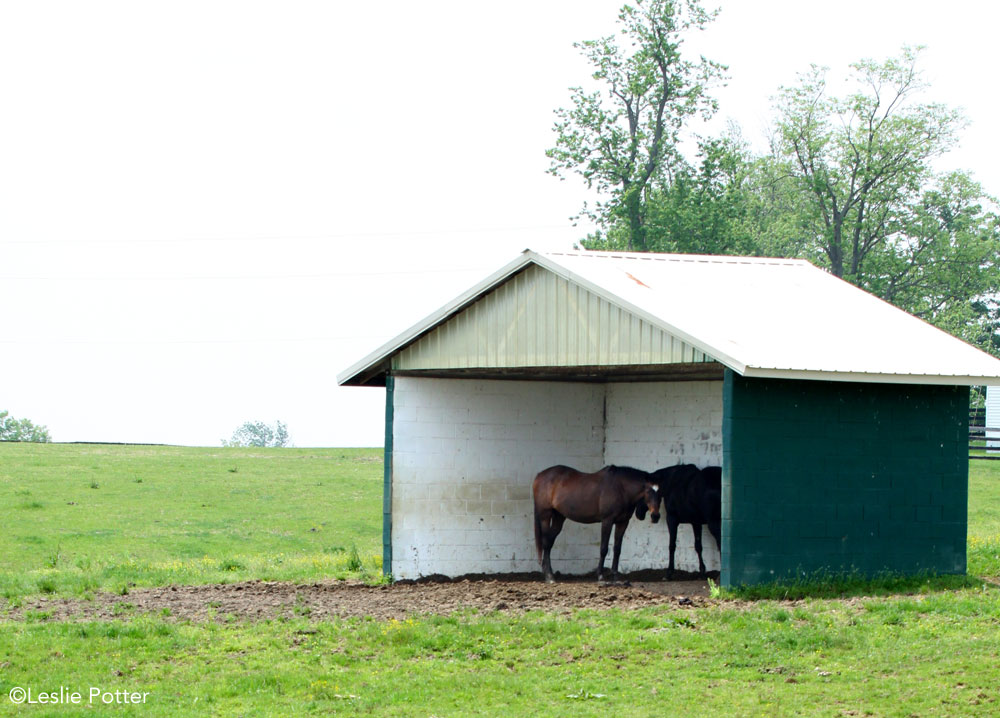
If you live in a reasonably populated area, you may be able to hire barn help so that all your time isn’t consumed by daily chores. Another option is to barter monthly stall board in exchange for work around the farm. Someone who has more time and energy than cash may be happy to work off part of their monthly board payment.
To minimize your workload, pasture your horses for all but the most inclement weather. Most horses thrive on pasture as long as they have access to shelter when the days are miserably hot, insects are biting, or frigid winds are blowing.
Horse-Care Costs
Rule #1: You can’t control most horse-care costs. Consider this carefully and budget accordingly before you ever think about buying a horse. The majority of horses’ basic needs have costs set by someone else. You can shop around for a deal, but the market determines what you’ll pay.
Rule #2: You’ll always have uncontrollable costs as long as you own horses.
You may be thinking you can contain horse-care costs the same way you economize other aspects of your life: If gasoline gets expensive, you drive less; if phone bills shoot up, you talk less; if utility charges go up, you adjust your thermostat. A horse needs hay in winter, bedding when stalled, regular farrier care, bi-annual vaccinations, periodic deworming, teeth floating and, depending upon condition, feed and supplements. You must pay the going rate.
The costs of feed, hay and bedding are governed by availability and the vagaries of weather in growing states. Because weather patterns have been unpredictable in recent years, the prices for agricultural commodities have skyrocketed. Competing uses for grain products have further hiked prices.
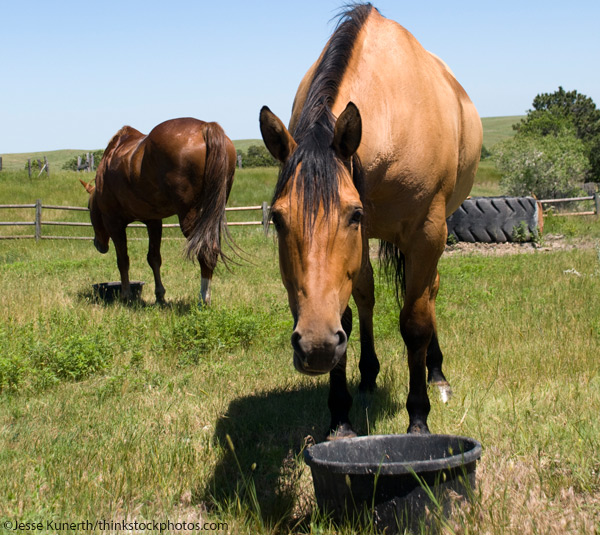
Predicting what your home horsekeeping costs might be compared to paying board is like trying to hit a moving target. And, if you consider your own time to have a monetary number, you probably can’t beat the value of a well-run boarding stable.
When comparing costs, be sure to include re-fencing your property if it was set up for cattle; horses should never be kept in barbed wire or large-mesh wire fence. Horses have much thinner skin than cattle and will be easily injured. Don’t forget equipment, maintenance, fuel, the cost of enough acreage to support your horses, and the amount you’ll spend for the extra horse you’ll need to keep the first one company!
That said, most owners with horses at home are not primarily motivated by cost. They see more positives than negatives about all the challenges of running their own show. Control is a huge factor. Home horsekeepers can choose their feed, set the barn schedule, and manage everything as they think it should be. This amount of control is very satisfying.
Boarding Your Horse
If you are someone who can’t wait to put a boot in the stirrup, boarding your horse is probably your best option. You may not hear the nicker of your horses’ greetings in the mornings, but you also won’t have to drag yourself out of bed to trudge across a snowy yard to shovel a path to the barn door, or pull on rubber boots in order to open a pasture fence after wading through mud as sticky as peanut butter. When boarding, all of the time-sucking, energy-draining tasks are done for you. And while monthly rates may seem astronomical to new horse owners, they are relatively reasonable when compared to other service industries.
At a boarding barn, you have the benefit of a caretaker being on duty if you want to go on vacation or can’t make it to the barn. When complications arise—such as soaking an abscessed hoof in a bucket twice a day, putting ointment in your horse’s infected eye three times a day, removing wraps and re-bandaging, or arranging for transportation to a specialty equine clinic for a sick horse—you have backup available on site.
Boarding at a full-service facility that caters to people on tight schedules relieves you of most of the time-consuming routine chores. You have the option to pay for extra services and spend all your time at the barn riding rather than performing mundane tasks. Some stables even have workers who groom and tack up your horse. Most horse owners want to be more hands-on than this but are glad to skip stall cleaning!
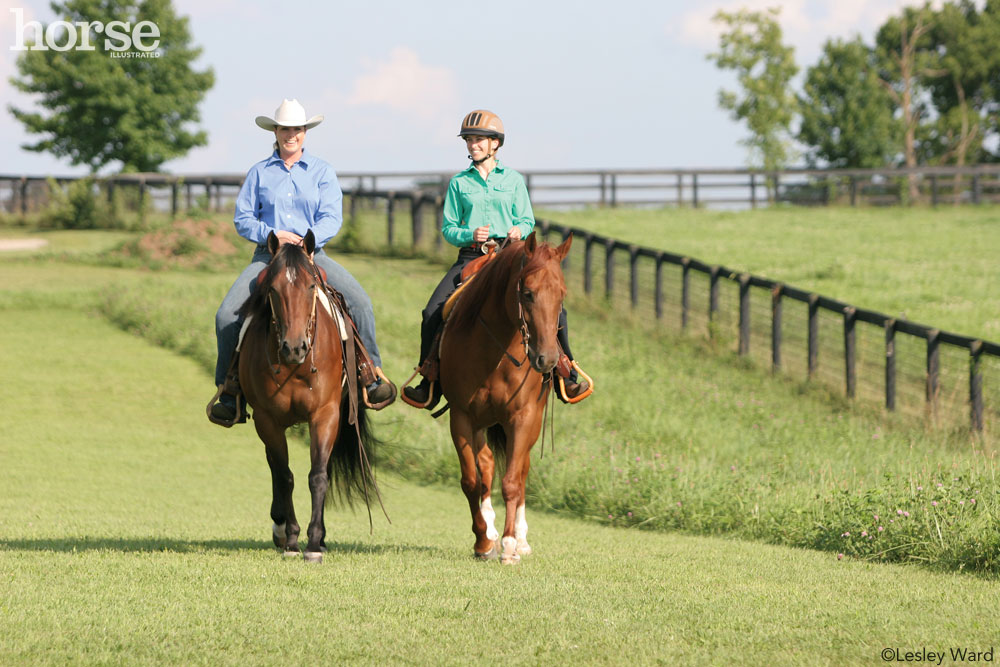
You’ll make friends and have riding buddies at a busy boarding stable.
Another good reason to board your horse rather than taking on the responsibility of self-care is the learning curve. Even basic horse care requires more knowledge than most people assume. Boarding offers the opportunity to learn from experienced horse owners. Because everyone at the barn shares your interest in horses, you have a wealth of information to tap into if you have any questions. Fellow boarders are generally happy to help you out if you are puzzled by a horse’s behavior or wonder whether your saddle fits properly.
Even better, you may have people to ride with. Group riding is invaluable for new riders who typically lack the confidence to head out down the trail alone. As herd animals, horses take comfort and feel braver in the presence of other horses; humans are actually the same. Balky, fearful horses can be persuaded by the horse in front to “follow the leader.” Each time your horse overcomes his reluctance to attempt something you ask of him and is successful, he builds confidence. Eventually, he doesn’t need the horse in front because he trusts you as his leader.
Another advantage of boarding your horse can be the opportunity to trailer off-site to horse shows, trail ride in state parks, or other activities. Many boarding stables are willing to haul boarders to nearby venues for a fee. Or, fellow boarders with horse trailers may welcome an extra passenger for company and to help share expenses.
Evaluating a Boarding Facility
- Ask whether 24/7 caretakers are on the premises.
- Make sure there is a bathroom for boarders.
- Check out indoor and outdoor arenas for size and footing.
- Inspect stalls for size, water availability, bedding depth and safety.
- Assess the quality of hay being fed.
- Ask if there’s a bathing area or wash rack.
- Check for safe turnout fencing; horses should never be contained by barbed wire or large-mesh wire designed for cattle.
- Determine if there is adequate barn ventilation.
- Look for secure tack storage.
- See if tools are organized and aisles are clutter-free.
- Figure out the mileage to the barn and estimate gas expenditure.
- Check out barn rules to make sure you don’t get any surprises—such as “not open on Mondays” or no non-boarders allowed to ride.
- Ask whether there is a barn farrier.
- See if there is a deworming policy (some barns require fecal testing).
- Ask about how much time the arena is used for lessons or occupied by trainers.
- Ask how the horses are grouped in the pasture.
- Find out if you can park a trailer.
- Find out the barn hours for boarders and holiday hours.
Ultimately, it doesn’t matter where your horse lives; what matters is how. Provide a safe environment, a consistent routine, exercise, quality feed, fresh water and appropriate health measures, and your horse will thrive.
Louann Chaudier lives in Eagle, Wisc. During the past 20 years, she and her husband have kept horses in boarding stables and have owned a horse farm.
This article originally appeared in the 2015 edition of Your New Horse.


